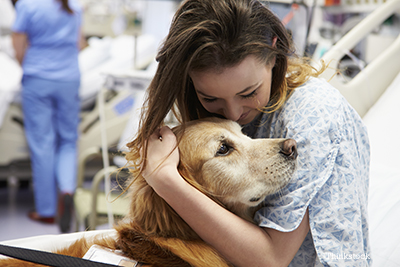
Animal-assisted visits in cancer treatment centers are gaining popularity. Patients undergoing chemotherapy or radiation therapy can opt for some doggie face time during their treatments. But does this truly influence the patient’s well-being? Until recently, scientific documentation of the benefits of pet-facilitated therapy for cancer patients has been lacking. A study published in the January Journal of Community and Supportive Oncology provides just such evidence.
How was the therapy dog study performed?
Acoording to OncologyPractice.com, the study titled, Beneficial effects of animal-assisted visits on quality of life during multimodal radiation-chemotherapy regimens evaluated 37 people undergoing a combination of chemotherapy and radiation therapy for treatment of head and neck cancer. Throughout their treatments, these patients received daily 15-20 minute animal-assisted visits. A questionnaire called the FACT-G (Functional Assessment of Cancer Therapy-General) was administered three times during the seven-week course of treatment. The responses of the patients demonstrated a significant increase in their sense of social and emotional well-being despite declines in their physical and functional well-being.
Have there been similar studies?
Principal researcher, Dr. Steward Fleishman called this study, “the first such definitive study in cancer.” He goes on to say,
“Having an animal-assisted visit significantly improved quality of life and humanized a high-tech treatment. Patients said they would have stopped their treatments before completion except for the presence of the certified Good Dog Foundation therapy dog and volunteer handler1."
This fabulous study was funded by Zoetis Animal Health and The Good Dog Foundation1.
What have we learned about therapy dogs?
Dr. Michael McFarland, director of Companion Animal Veterinary Operations at Zoetis stated1,
“There is mounting evidence in human and veterinary medicine that the emotional bond between people and companion animals can have a positive impact on emotional and physical health. These new results help advance our understanding of the value of animal-assisted therapy in cancer treatment and point to the ways the oncology and animal health communities can work together in supporting cancer patients to achieve the best possible outcome.”
Hats off to Zoetis Animal Health, Good Dog Foundation, and the researchers who performed this study. My hope is that these results will promote the interest and funding necessary to make animal-assisted therapy in medical settings an integral part of patient care.
Tell us about any experience you may have with animal-assisted therapy below.
If you have any questions or concerns, you should always visit or call your veterinarian -- they are your best resource to ensure the health and well-being of your pets.
Resources:
